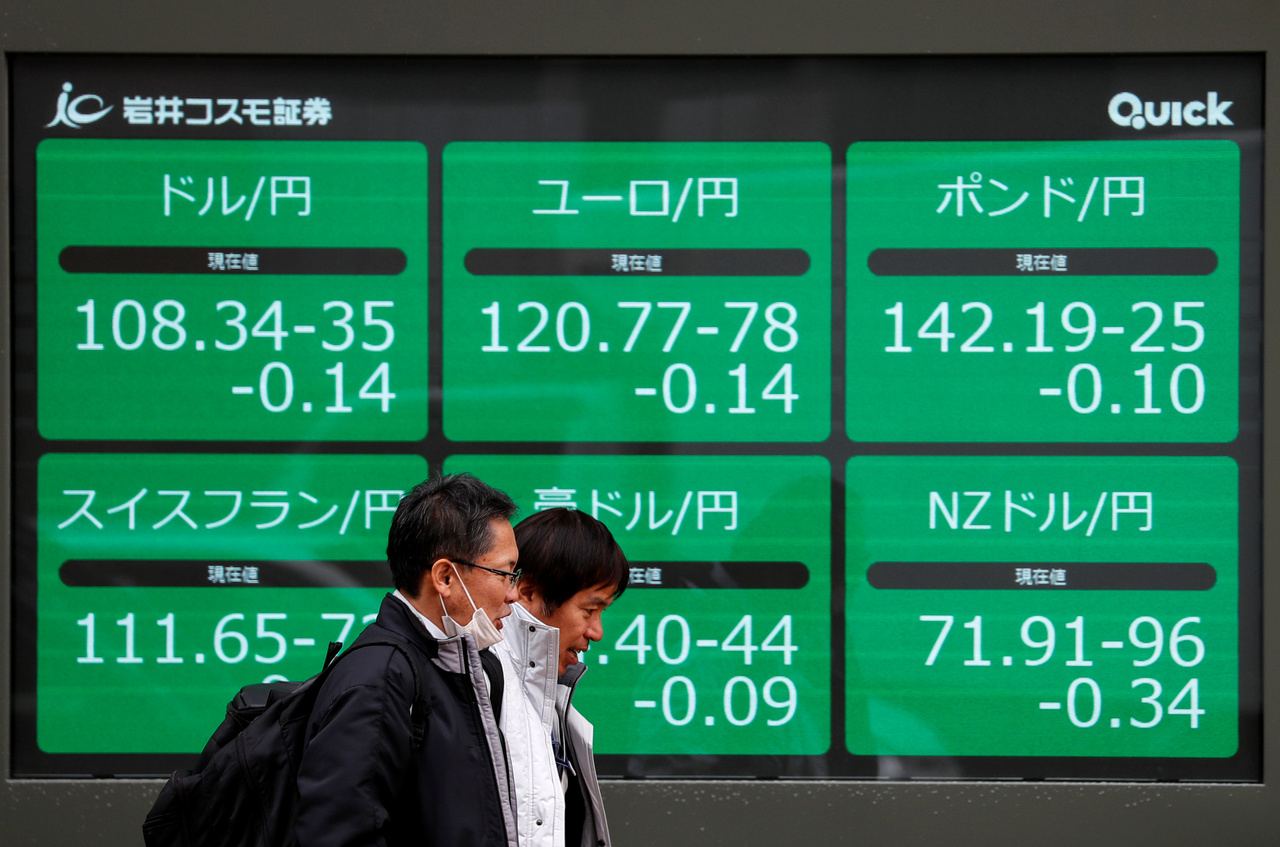Wuhan virus infects Asia stocks with exposure to China, Singapore index closes down 1.8%
Sign up now: Get ST's newsletters delivered to your inbox

Men walk past an electronic display showing the Japanese yen's exchange rates against world currencies in Tokyo on Jan 8, 2020.
PHOTO: REUTERS
Follow topic:
TOKYO (REUTERS, BLOOMBERG) - Asian markets fell on Tuesday (Jan 28) on rising concern about the impact of global travel bans associated with China's deadly coronavirus even as some stocks involved in preventative health spiked.
Shares of airlines and travel agents were sharply lower amid freezes on travel into and out of the world's second largest economy, while companies with an indirect exposure to Chinese consumer spending abroad, such as casinos and luxury retailers, also tumbled.
South Korea stocks tanked upon reopening after a holiday, with smaller losses in Japan and Australia. Chinese and Hong Kong markets remain closed.
The Kospi index in Seoul ended down 3.1 per cent, its sharpest one-day fall since Oct 11, 2018. Local stocks exposed to China, the biggest buyer of South Korean goods, dominated the losses. Cosmetic makers highly dependent on Chinese tourists visiting Seoul tumbled, with Tonymoly and Able C&C losing more than 12 per cent and 15 per cent, respectively. South Korea's top two airlines, Korean Air Lines and Asiana Airlines, dropped 6 per cent and 5 per cent.
On the other hand, mask producers, Kleannara and Monalisa were the best performers in the broader market, as they firmed 30 per cent each to hit intraday price limit.
"South Korea's economy could take a bigger hit compared with other Asian countries due to its significant trade volume with China," said Choi Seok-won, chief of SK Securities' research centre.
In Japan, the Nikkei 225 recovered some of its losses to close down 0.6 per cent while Australia's S&P/ASX 200 dropped 1.4 per cent. Japanese Economy Minister Yasutoshi Nishimura on Tuesday warned that corporate profits and factory production might take a hit from the coronavirus outbreak in ChinA.
Japan Airlines lost 7.9 per cent and airline ANA Holdings was down 6 per cent.
Shares of Australia's biggest airline Qantas Airways fell 5 per cent, while travel agent Webjet sank 11 per cent. Japan Airlines lost 7.9 per cent and airline ANA Holdings was down 6 per cent. Australia's top two casino companies Crown Resorts Ltd and Star Entertainment Group ltd, which both get a sizeable portion of revenue from vacationing Chinese gamblers, each fell about 5%.
Indonesia's Jakarta Composite Index dropped 0.4 per cent while Malaysia's Kuala Lumpur Composite Index closed down 1.4 per cent.
In Singapore, shares sank when trading reopened after the long Lunar New Year weekend. Minister for Trade and Industry Chan Chun Sing said on Monday (Jan 27) that the outbreak is expected to affect Singapore's economy, business and consumer confidence this year as the situation may persist for some time,
In Singapore, the Straits Times Index pared its day's loss to close down 58.77 points or 1.8 per cent at 3,181.25. It had earlier sank as much as 95.92 points or 2.96 per cent.
Singapore Airlines fell 26 cents or 3 per cent or $8.56, as did airline services provider Sats, which was 12 cents or 2.5 per cent lower at $4.71.
Sasseur Reit, which announced on Tuesday morning that it has temporarily closed its four outlet malls in China to help prevent the spread of the coronavirus, sank 9 cents or 10.3 per cent to 78.5 cents.
All three local banks closed lower but off their session lows. DBS shares fell 35 cents or 1.3 per cent to $25.85. OCBC dropped 20 cents cents or 1.8 per cent to $10.90 while UOB shed 39 cents or 1.5 per cent to $25.96.
In contrast, shares of Singapore-listed glove makers jumped again. Top Glove gained 45 cents or 23.7 per cent to $2.35. Riverstone Holdings rose 20 cents or 19.6 per cent to $1.22. UG Healthcare Corporation, spiked 9.5 cents or 61.3 per cent to 25 cents.
Medical stocks also continued to rally. Medtecs International, which makes hospital apparel and disposable personal protective equipment, was the most-heavily traded counter, soaring 6.8 cents or 65.4 per cent to 17.2 cents. Healthway Medical Group, which runs 60 clinics across Singapore, rallied 0.7 cent or 18 per cent to 4.6 cents
Overnight, the Dow Jones Industrial Average fell 453.93 points, or 1.6 per cent, to 28,535.8, the S&P 500 lost 51.84 points, or 1.6 per cent, to 3,243.63 and the Nasdaq Composite dropped 175.60 points, or 1.9 per cent, to 9,139.31.
Investor concern that China has failed to contain the pneumonia-like virus - which has killed at least 80 people and infected more than 2,700 - roiled markets at the start of a week jam-packed with corporate earnings. The outbreak shattered a calm in markets that hasn't seen a 1 per cent up-or-down move in the S&P 500 since early October.
"This is now a sell first, ask questions later situation," said Alec Young, managing director of global markets research at FTSE Russell. "Markets hate uncertainty, and the coronavirus is the ultimate uncertainty - no one knows how badly it will impact the global economy. China is the biggest driver of global growth, so this couldn't have started in a worse place."
China's financial markets will remain closed until next Monday after authorities extended the Lunar New Year break by three days as they grapple with the virus crisis.
Elsewhere, oil slipped to a more than three-month low. West Texas Intermediate crude fell 0.4 per cent to US$53.91 a barrel.
Safe haven gold, which has been rallying, dipped 0.2 per cent to US$1,579.08 an ounce.
With additional information from The Straits Times.

